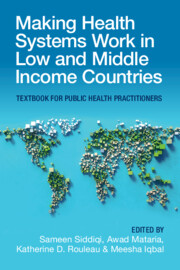 Making Health Systems Work in Low and Middle Income Countries
Making Health Systems Work in Low and Middle Income Countries Book contents
- Making Health Systems Work in Low and Middle Income Countries
- Reviews
- Making Health Systems Work in Low and Middle Income Countries
- Copyright page
- Dedication
- Contents
- About the Editors
- Contributors
- Preface
- Section 1 Analyzing Health Systems: Concepts, Components, Performance
- Chapter 1 Introduction to Health Systems
- Chapter 2 Health Systems Based on Primary Health Care
- Chapter 3 Universal Health Coverage and Health System Strengthening
- Chapter 4 Health System Governance
- Chapter 5 Financing Health Care
- Chapter 6 Health Workforce in Low and Middle Income Countries
- Chapter 7 The Pharmaceutical System and Its Components
- Chapter 8 Health Information Systems
- Chapter 9 The Organization and Management of Health Services
- Chapter 10 Health Services Delivery
- Chapter 11 Role and Contribution of the Community in Health System Strengthening
- Chapter 12 Performing Health Systems
- Chapter 13 Decision-Making Tools for Informed Decisions by Health Policymakers and Managers
- Chapter 14 Health Policy and Systems Research: The Role of Implementation Research
- Section 2 Transforming Health Systems: Confronting Challenges, Seizing Opportunities
- Index
- References
Chapter 13 - Decision-Making Tools for Informed Decisions by Health Policymakers and Managers
from Section 1 - Analyzing Health Systems: Concepts, Components, Performance
Published online by Cambridge University Press: 08 December 2022
- Making Health Systems Work in Low and Middle Income Countries
- Reviews
- Making Health Systems Work in Low and Middle Income Countries
- Copyright page
- Dedication
- Contents
- About the Editors
- Contributors
- Preface
- Section 1 Analyzing Health Systems: Concepts, Components, Performance
- Chapter 1 Introduction to Health Systems
- Chapter 2 Health Systems Based on Primary Health Care
- Chapter 3 Universal Health Coverage and Health System Strengthening
- Chapter 4 Health System Governance
- Chapter 5 Financing Health Care
- Chapter 6 Health Workforce in Low and Middle Income Countries
- Chapter 7 The Pharmaceutical System and Its Components
- Chapter 8 Health Information Systems
- Chapter 9 The Organization and Management of Health Services
- Chapter 10 Health Services Delivery
- Chapter 11 Role and Contribution of the Community in Health System Strengthening
- Chapter 12 Performing Health Systems
- Chapter 13 Decision-Making Tools for Informed Decisions by Health Policymakers and Managers
- Chapter 14 Health Policy and Systems Research: The Role of Implementation Research
- Section 2 Transforming Health Systems: Confronting Challenges, Seizing Opportunities
- Index
- References
Summary
The process of decision making is not linear and is affected by multiple factors, other than availability of evidence, such as political context, personal over public interests, decision makers’ accountability, relationships with stakeholders, and familiar experiences in the past. Evidence-informed decisions positively influence access, quality, efficiency, equity, and sustainability of health services, and improve transparency and accountability thereby reducing wastage, abuse, and corruption in the health system. This chapter presents six decision making tools that help policy makers and managers take evidence-informed decisions: burden of disease analysis; health technology assessment; cost-effectiveness analysis; health equity analysis; national health accounts analysis; and stakeholder analysis. The list of tools is not exhaustive, and additional tools can be explored to respond to the context and nature of the public health concern. Policymakers are not expected to know all their methodological aspects, rather they should know what tools are available, their purpose and application, strengths and limitations, and how to interpret the results in the local context.
Keywords
- Type
- Chapter
- Information
- Making Health Systems Work in Low and Middle Income CountriesTextbook for Public Health Practitioners, pp. 186 - 207Publisher: Cambridge University PressPrint publication year: 2022
